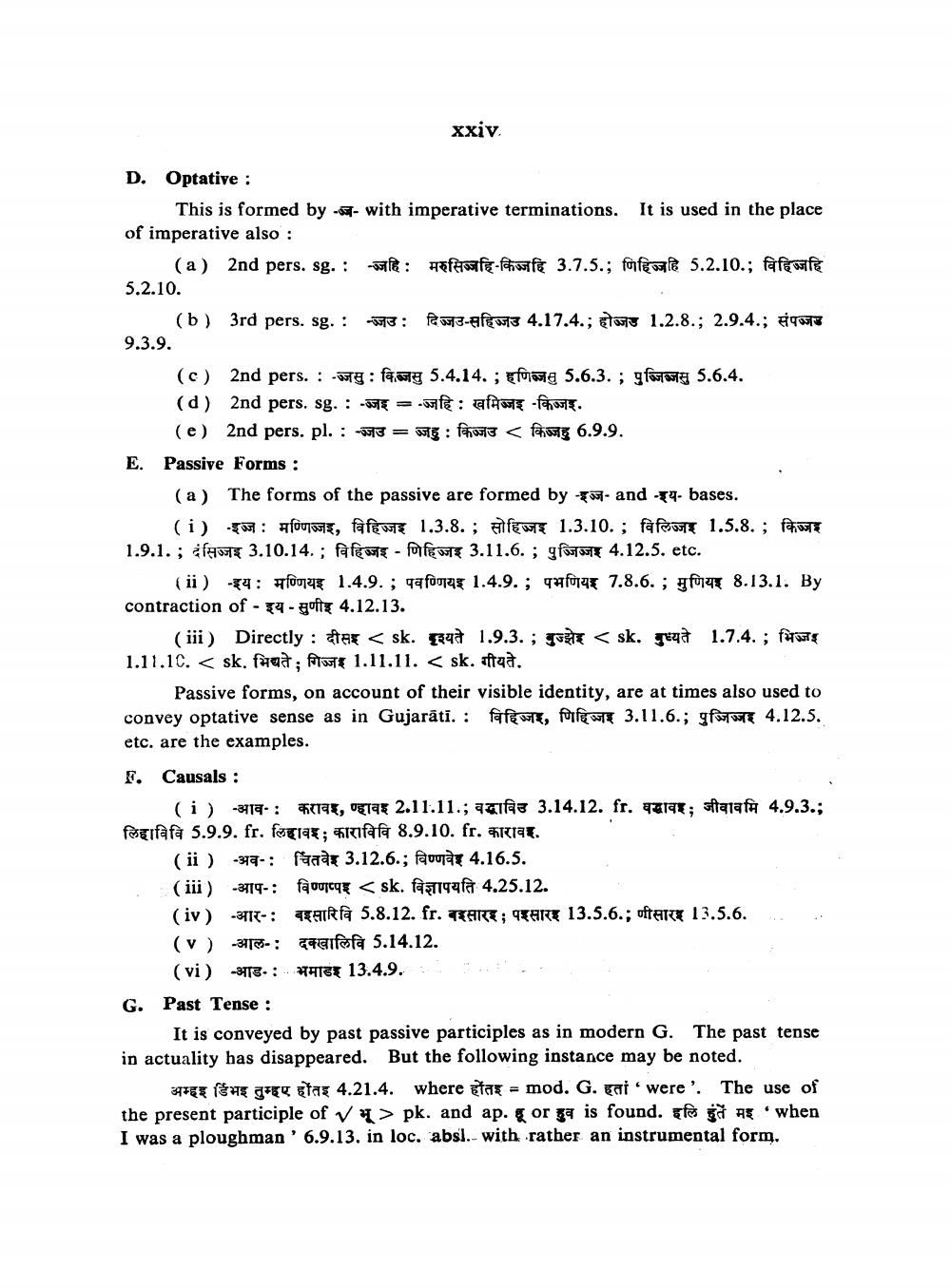________________
xxiv.
D. Optative :
This is formed by -- with imperative terminations. It is used in the place of imperative also :
(a) 2nd pers. sg. : -जहि : मरुसिजहि-किजहि 3.7.5.; णिहिज्जहि 5.2.10.; विहिज्जहि 5.2.10.
(b) 3rd pers. sg. : -जउ : दिज्जउ-सहिज्जउ 4.17.4.; होज्जड 1.2.8.; 2.9.4.; संपज्जा 9.3.9.
(c) 2nd pers. : .जसु : किब्जसु 5.4.14.; हणिज्जसु 5.6.3. ; पुजिजसु 5.6.4. (d) 2nd pers. sg. : -ज्जइ = जहि : खमिज्जइ -किज्जइ.
(e) 2nd pers. pl. : -जउ = जहु : किजउ < किज्जहु 6.9.9. E. Passive Forms :
(a) The forms of the passive are formed by -इज्ज- and -इय- bases.
(i) -इज्ज : मण्णिज्जइ, विहिज्जइ 1.3.8. ; सोहिज्जइ 1.3.10.; विलिज्जइ 1.5.8.; किजइ 1.9.1.; दसिज्जइ 3.10.14.; विहिज्जइ - णिहिज्जइ 3.11.6.; पुजिज्जइ 4.12.5. etc.
(ii) -इय : मण्णियइ 1.4.9.; पवण्णियइ 1.4.9.; पभणियह 7.8.6.; मुणियइ 8.13.1. By contraction of - इय - सुणीइ 4.12.13.
(iii) Directly : दीसह <sk. दृश्यते 1.9.3. ; बुज्झेइ <sk. बुध्यते 1.7.4.; भिजइ 1.11.1C. <sk. भियते; गिज्जइ 1.11.11.<sk. गीयते.
Passive forms, on account of their visible identity, are at times also used to convey optative sense as in Gujarati. : विहिज्जइ, णिहिज्जर 3.11.6.; पुजिज्जह 4.12.5. etc. are the examples. F. Causals:
(i) -आव-: करावइ, ण्हावइ 2.11.11.; वदाविउ 3.14.12. fr. पडावर जीवावमि 4.9.3.; लिहाविवि 5.9.9. fr. लिहावद काराविवि 8.9.10. fr. कारावा.
(ii ) -अव-: चिंतवेइ 3.12.6.; विण्णवेइ 4.16.5. (iii) -आप-: विण्णप्पइ <sk. विज्ञापयति 4.25.12. (iv) -आर-: बइसारिवि 5.8.12. fr. बइसारइ पइसारइ 13.5.6.; णीसारइ 13.5.6. (v) -आल-: दक्खालिवि 5.14.12. (vi) -आड.:. भमाडइ 13.4.9.
. G. Past Tense:
It is conveyed by past passive participles as in modern G. The past tense in actuality has disappeared. But the following instance may be noted.
अम्हइ डिभइ तुम्हए होतइ 4.21.4. where होतइ = mod. G. हतां 'were'. The use of the present participle of / भू> pk. and ap. or हुव is found. इलि हुँते मइ 'when I was a ploughman' 6.9.13. in loc. absl.- with rather an instrumental form.




